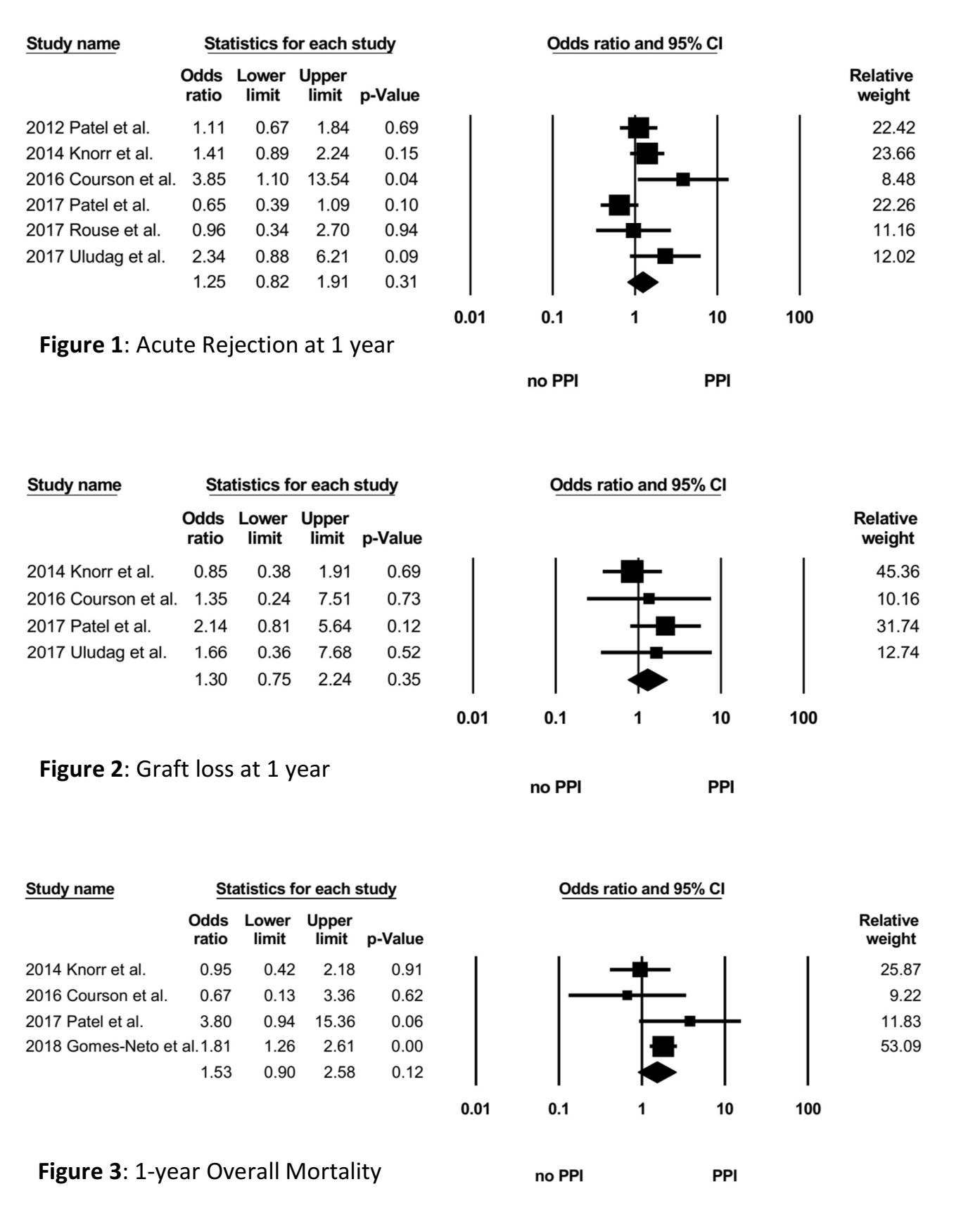Effects of Proton Pump Inhibitors on Allograft Rejection and Adverse Effects in Kidney Transplant Recipients: A Systemic Review and Meta-Analysis
B. Boonpheng1, C. Thongprayoon2, M. A. Mao3, W. Cheungpasitporn4
1Internal Medicine, East Tennessee State University, Johnson City, TN, TN, 2Nephrology, Mayo Clinic, Rochester, MN, MN, 3Nephrology, Mayo Clinic, Rochester, MN, 4Internal Medicine, University of Mississippi Medical Center, Jackson, MI, MS
Meeting: 2019 American Transplant Congress
Abstract number: C160
Keywords: Graft function, Meta-analysis, Rejection, Renal dysfunction
Session Information
Session Name: Poster Session C: Kidney: Acute Cellular Rejection
Session Type: Poster Session
Date: Monday, June 3, 2019
Session Time: 6:00pm-7:00pm
 Presentation Time: 6:00pm-7:00pm
Presentation Time: 6:00pm-7:00pm
Location: Hall C & D
*Purpose: The adverse renal effects of proton pump inhibitors (PPIs) are being increasingly recognized in both the general population and chronic kidney disease patients. Several pharmacokinetic studies have also raised concerns about interaction between PPIs and the immunosuppressive drugs in transplant patients. Whether the adverse effects of PPIs have a clinical significance in kidney transplant recipients remains unclear. We performed this meta-analysis to assess the risk of acute rejection, graft loss, hypomagnesemia and overall mortality in kidney transplant recipients on PPI compared to those without PPI exposure.
*Methods: A systematic review was conducted in MEDLINE, EMBASE and Cochrane databases from inception through October 2018 to identify studies that evaluated the adverse effects of proton pump inhibitors in kidney transplant recipients, including biopsy-proven acute rejection, graft loss, hypomagnesemia and overall mortality. Effect estimates from the individual studies were extracted and combined using random-effect, generic inverse variance method of DerSimonian and Laird.
*Results: 10 observational studies with a total of 5,649 kidney transplant patients were enrolled. There were no significant association between PPI exposure and the risk of biopsy-proven acute rejection at 1 year (pooled OR 1.25, 95%CI 0.82-1.91, I2= 55%), graft loss at 1 year (pooled OR 1.30, 95%CI 0.75-2.24, I2= 0%) or overall mortality (pooled OR 1.53, 95%CI 0.90-2.58, I2= 34%). However, PPI exposure was significantly associated with hypomagnesemia with a pooled OR of 1.56 (95%CI 0.19-2.05, I2= 27%). Funnel plots and Egger’s regression asymmetry test were performed and showed no publication bias.
*Conclusions: PPI use was not associated with significant risks of higher acute rejection, graft loss or overall mortality at one year. However, the risk of hypomagnesemia was significantly increased with PPI use.
To cite this abstract in AMA style:
Boonpheng B, Thongprayoon C, Mao MA, Cheungpasitporn W. Effects of Proton Pump Inhibitors on Allograft Rejection and Adverse Effects in Kidney Transplant Recipients: A Systemic Review and Meta-Analysis [abstract]. Am J Transplant. 2019; 19 (suppl 3). https://atcmeetingabstracts.com/abstract/effects-of-proton-pump-inhibitors-on-allograft-rejection-and-adverse-effects-in-kidney-transplant-recipients-a-systemic-review-and-meta-analysis/. Accessed January 11, 2026.« Back to 2019 American Transplant Congress

